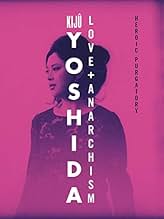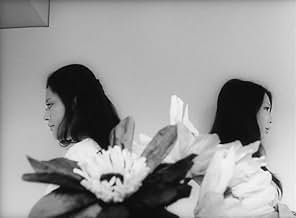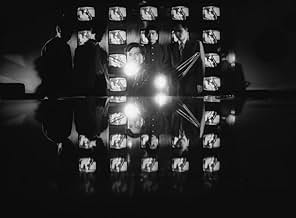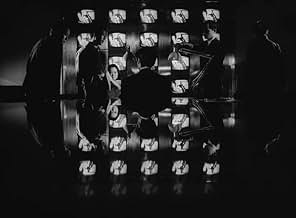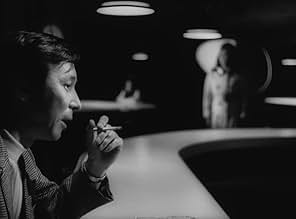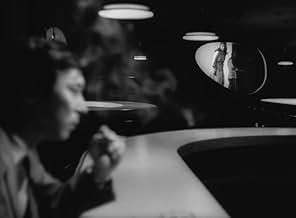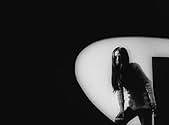An engineer's wife returns home with a lost teenager. A man posing as her dad tries to get her back, causing the engineer to recall his youth as a revolutionary, obscured by dreamlike disrup... Read allAn engineer's wife returns home with a lost teenager. A man posing as her dad tries to get her back, causing the engineer to recall his youth as a revolutionary, obscured by dreamlike disruptions of time and space, fantasy and reality.An engineer's wife returns home with a lost teenager. A man posing as her dad tries to get her back, causing the engineer to recall his youth as a revolutionary, obscured by dreamlike disruptions of time and space, fantasy and reality.
- Director
- Writer
- All cast & crew
- Production, box office & more at IMDbPro
Featured reviews
An engineer's wife returns home with a lost teenager. A man posing as her dad tries to get her back, causing the engineer to recall his youth as a revolutionary, obscured by dreamlike disruptions of time and space, fantasy and reality.
Although I did not care for "Eros" the way some people do, I actually liked this one a bit more. Yes, the picture is washed out and I wish it was not. But the clever angles and framing made me enjoy the film from the opening shots. It has a very science fiction feeling to it at times, and I wish it had more of that.
As part of the "radicalism trilogy", I would say this is my favorite of the three. I am not crazy about Yoshishige Yoshida, but this film at least struck a bit of a cord with me.
Although I did not care for "Eros" the way some people do, I actually liked this one a bit more. Yes, the picture is washed out and I wish it was not. But the clever angles and framing made me enjoy the film from the opening shots. It has a very science fiction feeling to it at times, and I wish it had more of that.
As part of the "radicalism trilogy", I would say this is my favorite of the three. I am not crazy about Yoshishige Yoshida, but this film at least struck a bit of a cord with me.
Yoshida's films are luminous, ethereal creations, languid love affairs blown into abstract shape by memory and time. In the period when he studied/essayed the great Antonioni, he gave us films of simple, perhaps ponderous beauty. But with Eros+Massacre he finally unraveled. This is a companion piece to that labyrinth.
I can't imagine what it must've been to see this back in 1970 with fresh eyes, what possibilities of cinema it may have opened. Thirty years later I can see that some of the things Yoshida foresaw panned out, others didn't. But this film is a maddening enigma that stands the test of that time passed, meaning it's not simply a cultural artifact of New Wave and the time when the revolutionary spirit was believed to be a force of change, but an entire evolutionary phase of cinema, New Wave before and after.
If the movie works then as more than bold experiment, it's because these particular ephemeral struggles are abstracted, the lifetime they in turn inspire and disappoint is fragmented, past and future spinning out of original frameworks. What we get from this rearrangement is a snapshot of human beings caught into disparate planes of existence, wishing to see or connect or recognize meaning in what they do.
In a brilliant scene that takes place in the 80's, one of many flash forwards into future or imaginary time, the cast of characters is assembled in an open space to hold court. Unable to properly remember a key event, they turn to a figure perched in a high chair holding a film camera to arbitrate. This surrogate filmmaker allows them back in time.
We see how the two lovers met, we see where that love brought them. We get here a beautiful realization, that the man's greatest aspiration, who is a famous scientist, is to be a good husband to his wife. The camera looks back at Mariko Okada, standing a little back from her husband being interviewed, and we see her gracefully, stoically looking out a window. Yoshida's gentle tribute to the love of his life, his wife in real life.
We see an entire life, shared by these two people, be trapped in moral dilemmas and modern anxieties, thought to be important at the time, lifechanging, with hindsight though nothing but trivial. We see them struggle to remember or forget. Yoshida gives us here a bitter last goodbye to the spirit of '68, showing us how the romance with the social struggle grew sour. These ideas having led nowhere, our only chance for happiness is with our other half that completes us. The one romance that matters.
The film is the final moments of consciousness, memory looking back upon itself.
I can't imagine what it must've been to see this back in 1970 with fresh eyes, what possibilities of cinema it may have opened. Thirty years later I can see that some of the things Yoshida foresaw panned out, others didn't. But this film is a maddening enigma that stands the test of that time passed, meaning it's not simply a cultural artifact of New Wave and the time when the revolutionary spirit was believed to be a force of change, but an entire evolutionary phase of cinema, New Wave before and after.
If the movie works then as more than bold experiment, it's because these particular ephemeral struggles are abstracted, the lifetime they in turn inspire and disappoint is fragmented, past and future spinning out of original frameworks. What we get from this rearrangement is a snapshot of human beings caught into disparate planes of existence, wishing to see or connect or recognize meaning in what they do.
In a brilliant scene that takes place in the 80's, one of many flash forwards into future or imaginary time, the cast of characters is assembled in an open space to hold court. Unable to properly remember a key event, they turn to a figure perched in a high chair holding a film camera to arbitrate. This surrogate filmmaker allows them back in time.
We see how the two lovers met, we see where that love brought them. We get here a beautiful realization, that the man's greatest aspiration, who is a famous scientist, is to be a good husband to his wife. The camera looks back at Mariko Okada, standing a little back from her husband being interviewed, and we see her gracefully, stoically looking out a window. Yoshida's gentle tribute to the love of his life, his wife in real life.
We see an entire life, shared by these two people, be trapped in moral dilemmas and modern anxieties, thought to be important at the time, lifechanging, with hindsight though nothing but trivial. We see them struggle to remember or forget. Yoshida gives us here a bitter last goodbye to the spirit of '68, showing us how the romance with the social struggle grew sour. These ideas having led nowhere, our only chance for happiness is with our other half that completes us. The one romance that matters.
The film is the final moments of consciousness, memory looking back upon itself.
"Heroic Purgatory" (1970) was my first Yoshida, and I'll certainly try to see more than the three films released by Arrow in the "Love + Anarchism" set.
It's definitely avant-garde in the classic sense of the term, marching in the vanguard of utilizing fluid experimental dream language. I know I'll eventually revisit Godard and the French New Wave in the future, whose work at this writing I'd consider dull and uninteresting, but this is the exact opposite of dull: not only is it visually masterful, the story, no matter how evasive and at times elliptical like an afterthought, is actually interesting.
I definitely see, based on this one film, how Yoshida might have influenced Wong, or even Malick's "modern style" from "The Tree of Life" (2011) onwards. And if not, having seen this one really does add to the aforementioned directors' films.
I'm not sure whether the experience would lend itself for a repeat viewing anytime soon, since because of the elliptical nature of the film, despite the complete mastery of the visuals, and Yoshida is clearly a master at work, the film is purposefully obscure. But if one approaches it like a dream, it's a wonderful audiovisual journey through some very unusual ways to see the world.
It's fun to know really nothing at all about Yoshida, other than him starting out under Kinoshita's tutelage. It strongly resembles the Ozu-Imamura relationship, where the "old", strict formalism (or what would certainly seem as such by the new generation of filmmakers) in its part has influenced the radical swerves of the apprentices. I'd really like to know what he thought of Teshigahara.
It's definitely avant-garde in the classic sense of the term, marching in the vanguard of utilizing fluid experimental dream language. I know I'll eventually revisit Godard and the French New Wave in the future, whose work at this writing I'd consider dull and uninteresting, but this is the exact opposite of dull: not only is it visually masterful, the story, no matter how evasive and at times elliptical like an afterthought, is actually interesting.
I definitely see, based on this one film, how Yoshida might have influenced Wong, or even Malick's "modern style" from "The Tree of Life" (2011) onwards. And if not, having seen this one really does add to the aforementioned directors' films.
I'm not sure whether the experience would lend itself for a repeat viewing anytime soon, since because of the elliptical nature of the film, despite the complete mastery of the visuals, and Yoshida is clearly a master at work, the film is purposefully obscure. But if one approaches it like a dream, it's a wonderful audiovisual journey through some very unusual ways to see the world.
It's fun to know really nothing at all about Yoshida, other than him starting out under Kinoshita's tutelage. It strongly resembles the Ozu-Imamura relationship, where the "old", strict formalism (or what would certainly seem as such by the new generation of filmmakers) in its part has influenced the radical swerves of the apprentices. I'd really like to know what he thought of Teshigahara.
This is a movie that was made in the late '60s, early '70s period of Japan when Japan influenced by the Hippie culture was experimenting with their own brand of Avant Garde culture that was sometimes called "Angura". This is shortened Japanese pronunciation for "Underground". As the word suggests, these were experimental non-mainstream production that explored much about free sex, and anti establishment view of the world. Rengoku Eroica was made during the period of such social movement. The director of this movie, Yoshishige Yoshida (Sometimes pronounced Kijyu Yoshida) always had Avant Garde taste to his movies. He was one of the directors that were part of movement called Nuberu bagu ( from the French nouvelle vague) or Japanese New Wave. This can be seen in movie such as Amai Yoru No Hate (1961) starring Masahiko Tsugawa. So this movie was a perfect match for the director. The movie also stars his wife Mariko Okada as the mother of the young rebellious daughter.
The core story of this movie is bit like cheap science fiction. There's would be rocket scientist, guerrillas trying to kidnap an ambassador, wife, daughter that plays disjointed story segments that takes sudden detours in topics that keeps things away from from reality.
It was escapism that had intellectual pride at its core. Youth then were running away from responsibility, but were justifying it in many philosophical smoke and mirror. If you watch this movie, you can see this clearly, as you can't pin down who's responsible for what, and everything is just a play without any reality.
This type of movie rapidly lost favor with the public after the late '60s, and Yoshida himself had to move away from making movies to making TV documentaries. What a drastic swing from non-reality to pure reality. Other directors who were part of Japanese New Wave such as Nagisa Ooshima had to go to France to continue his movie making.
Experimental, and artsy, but the movie has no substance. It's interesting to watch, but don't expect to get anything deep from this movie.
The core story of this movie is bit like cheap science fiction. There's would be rocket scientist, guerrillas trying to kidnap an ambassador, wife, daughter that plays disjointed story segments that takes sudden detours in topics that keeps things away from from reality.
It was escapism that had intellectual pride at its core. Youth then were running away from responsibility, but were justifying it in many philosophical smoke and mirror. If you watch this movie, you can see this clearly, as you can't pin down who's responsible for what, and everything is just a play without any reality.
This type of movie rapidly lost favor with the public after the late '60s, and Yoshida himself had to move away from making movies to making TV documentaries. What a drastic swing from non-reality to pure reality. Other directors who were part of Japanese New Wave such as Nagisa Ooshima had to go to France to continue his movie making.
Experimental, and artsy, but the movie has no substance. It's interesting to watch, but don't expect to get anything deep from this movie.
Pure geometric chaos in Yoshida Yoshishige's "Heroic Purgatory", which is also the second film in his Trilogy of Japanese Radicalism, produced under the aegis of Japan's legendary Art Theater Guild. This is probably my fav film of his, especially in terms of visuals. Watching it feels like falling into a trance, I keep chasing the high of watching Heroic Purgatory, but no other Yoshida movie has come close.
Yoshida's strength is without a doubt his image composition, the way he frames his shots is so meticulously done. The story centers around an engineer and his wife (played by the great Hiroshi Inagaki regular Mariko Okada, who is also Yoshida's spouse and long term collaborator) who find a lost teenager leading the engineer to recall his younger days as a political radical. As this narrative plays out, Nanako's husband tells the story of his past when they met in a time when he was involved in reformist politics. Underneath, this film explores the past, present and future of the early 1970's political radicalism in a volatile Japan. As the film progresses, the temporal space is crushed mixing past, present, and future together. Abandoning linear storytelling for an ethereal trip into a labyrinth of memories, fears and delusions Yoshida gives viewers a stylistic feast injected into a revolutionary thriller. Cinematographer Motokichi Hasegawa and editor Hiroyuki Yasuoka, presents a visual language that recalls other great films (appropriate given Yoshida's background as a film critic...he also wrote a book on the films of Yasujiro Ozu) while continually exploring new ground; there's so many compositions, so many scenes that defy the conventional expectations of filmmaking...it's absolutely intoxicating to behold. Toshi Ichiyanagi's score is also a tremendous win, giving an atmospheric almost science fiction-like vibe to accentuate the stunning visuals.
Yoshida's strength is without a doubt his image composition, the way he frames his shots is so meticulously done. The story centers around an engineer and his wife (played by the great Hiroshi Inagaki regular Mariko Okada, who is also Yoshida's spouse and long term collaborator) who find a lost teenager leading the engineer to recall his younger days as a political radical. As this narrative plays out, Nanako's husband tells the story of his past when they met in a time when he was involved in reformist politics. Underneath, this film explores the past, present and future of the early 1970's political radicalism in a volatile Japan. As the film progresses, the temporal space is crushed mixing past, present, and future together. Abandoning linear storytelling for an ethereal trip into a labyrinth of memories, fears and delusions Yoshida gives viewers a stylistic feast injected into a revolutionary thriller. Cinematographer Motokichi Hasegawa and editor Hiroyuki Yasuoka, presents a visual language that recalls other great films (appropriate given Yoshida's background as a film critic...he also wrote a book on the films of Yasujiro Ozu) while continually exploring new ground; there's so many compositions, so many scenes that defy the conventional expectations of filmmaking...it's absolutely intoxicating to behold. Toshi Ichiyanagi's score is also a tremendous win, giving an atmospheric almost science fiction-like vibe to accentuate the stunning visuals.
Did you know
- TriviaThe second movie in Yoshishige Yoshida's unofficial trilogy on Japanese radicalism. The other two titles are Eros + Massacre (1969) and Coup d'Etat (1973).
- How long is Heroic Purgatory?Powered by Alexa
Details
- Release date
- Country of origin
- Language
- Also known as
- Heroic Purgatory
- Production companies
- See more company credits at IMDbPro
- Runtime1 hour 58 minutes
- Color
- Sound mix
- Aspect ratio
- 1.33 : 1
Contribute to this page
Suggest an edit or add missing content


